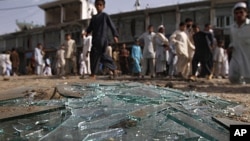Some South Asian analysts say momentum is building towards a political process designed to lead to negotiations to pursue a peace settlement in Afghanistan. But other experts are warning it could take years before reconciliation between the warring forces could occur.
U.S. Deputy Special Representative for Afghanistan and Pakistan Vikram Singh says at some point there has to be a political resolution to the Afghan conflict.
Singh says State Department officials believe the surge of U.S. troops in Afghanistan has helped set the stage for a political process that is more hopeful now than at any time in the pas “Does that mean we think peace is on the horizon, that there is going to be the Taliban, President [Hamid] Karzai and the Pakistanis and we all sit down and we will pretty quickly work this out and it will be great and next year this time we will all be celebrating? No. We do not think this is going to be easy," he said.
News reports say officials from the Obama administration have engaged in exploratory talks with representatives of the Taliban, although such discussions are said to be preliminary.
U.S. officials say any settlement must result in an end to violence by the Taliban, an agreement by insurgents to conform to the Afghan constitution and respect for the rights of women and the rule of law.
Vikram Singh says the international community has reached what he calls a critical time in the overall effort to bring stability to Afghanistan. “What we are doing is in support of a political process, that we are open to a political process. I wish I could tell you that [the] political process was underway. It is not yet, but it is tangible, it is close, it needs a lot of critical thinking," he said.
News reports say U.S. officials believe the death of Osama bin Laden last month in Pakistan could facilitate progress in talks with the Taliban.
Hamish Nixon coordinates a research project on the possibilities of a peace process in Afghanistan at the U.S. Institute of Peace. “U.S. policy is shifting incrementally towards a situation which accepts not only the necessity, but the necessity of mapping out in more detail the kind of process which would likely be successful," he said.
Center for a New American Security analyst Andrew Exum served on active duty in the U.S. Army in Iraq and Afghanistan. He says allied commanders in Afghanistan do not believe there is likely to be any peace agreement with the Taliban in the near future.
“The U.S. military, at least, and the NATO ISAF (International Security Assistance Force) command looks at reconciliation, meaning an enforceable accord, as being quite far away. And therefore it has put a low priority on reconciliation, as far as I can see it, and more on the reality I think it sees, 'We are going to be fighting a persistent insurgency in Afghanistan for some time now, beyond 2014," he said.
U.S. President Barack Obama and NATO have set 2014 as the date to end a withdrawal of combat troops from Afghanistan and turn over responsibility for security to Afghan forces.
Earlier attempts to open talks with the Taliban failed when an alleged insurgent leader, secretly flown to Kabul from Pakistan, turned out to be an imposter.
Former Afghan interior minister Ali Jalali says it is difficult to identify Taliban leaders who may be willing to negotiate. “Nobody knows so far who is in charge, who is speaking for the Taliban," he said. "Who are the legitimate interlocutors?”
Carnegie Endowment for International Peace senior associate Ashley Tellis specializes in South Asia affairs. Tellis says the only incentive the insurgents have to negotiate would be if there is a fundamental change in the balance of power that threatens their goal of toppling the current Afghan government.
“I think at the moment there has been progress made in terms of weakening their capacities, but it has not been sufficient and there is no assurance that it will be enduring. So even if one can bring them to the table I think there is simply no deal to be had right now," she said.
Analysts say any peace talks that could lead to a settlement of the Afghan conflict must include Pakistan, where many Taliban leaders are believed to be hiding.
Analyst Moeed Yusuf is the South Asia advisor at the U.S. Institute of Peace. “What is Pakistan trying to do? I think a clear message over and over, 'Start reconciliation now.' If you do it now we have the best chance of bringing these people to the table. If you delay it things will actually get out of control," he said.
The United States, Pakistan and Afghanistan have begun high-level trilateral talks to discuss the process of reconciliation.




